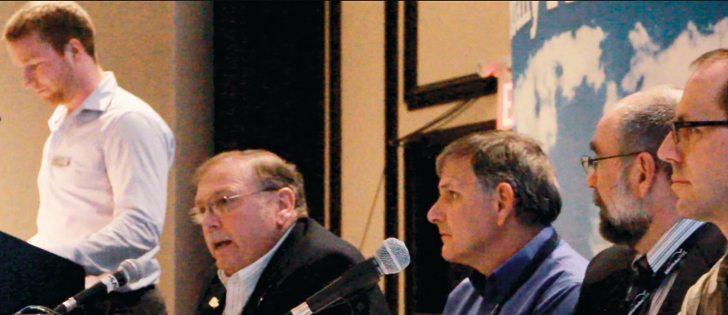Porcine epidemic diarrhea | Producer limits visitors to farm, requires truckers to stay in vehicle
Focusing on the little things can help producers keep free of porcine epidemic diarrhea, even if they are surrounded by the virus.
Iowa hog farmer Bill Tentinger, who operates in the most heavily hog-populated area of the United States, is 800 metres away from an infected farm but has been disease-free since the outbreak began.
“It’s those little things,” Tentinger told the Manitoba Pork Council’s annual meeting April 9.
Tentinger said he tightly controls access to his farm, restricts movement within the farm and always thinks about tiny factors of risk that could lead to major problems such as those being felt across the U.S. hog herd and now in Canada.
Read Also

Final crop reports show strong yields, quality
Crops yielded above average across the Prairies this year, and quality is generally average to above-average.
For instance, the approved disinfectant available to U.S. farmers is 99 percent effective, which means there is always a one percent chance of PED getting through, regardless of cleaning.
“I’ve always got those things on my mind and I’m always just trying to take care of the little things,” he said.
PED is sending shivers through Manitoba’s massive hog industry.
It has spread for a year through the U.S. herd just south of the border, to where millions of Manitoba weanlings are regularly shipped.
Two facilities have now been confirmed as infected. The first was identified in February on a farm and the second, announced April 10, is a “high-traffic site” in western Manitoba, according to Manitoba’s chief veterinary officer.
The office said the new infection likely occurred from “environmental contamination present on that site and not on their farm of origin.”
Tentinger, who is surrounded by infected farms and has lost his two Midwestern weanling suppliers because they became infected, said he attributes his success to tight bio-security, including:
- not allowing truckers to get out of feed trucks
- locking all doors on the farm except for the main access door to the barns
“I’ve eliminated as much traffic as I can,” said Tentinger.
“I’ve discouraged neighbours, friends, everybody from coming over and even visiting my shop.”
Tentinger urged Manitoba hog farmers to notice tiny elements of disease risk, as he did when he saw his worker’s wallet protruding from a pocket and at risk of falling to the floor.
“Where did he lay that wallet? Maybe he laid that wallet on the counter at the local (convenience store) or something,” said Tentinger.
“It’s (often-ignored risk factors like) your cellphone. It’s all of that.”
Tentinger said he doesn’t have maximum biosecurity. The farm doesn’t shower in and shower out and he buys feed from a commercial mill rather than making it himself.
However, he controls everything he can, which seems to be working.
Being a small producer with only one worker helps control possible disease contact points, he said.
“It gives me a little advantage.”
Tentinger said PED isn’t the most financially costly disease. A friend of his who calculated the loss from his own outbreak said a previous PRRS outbreak cost 80 percent more than the PED outbreak.
However, the human toll of PED is much worse. Outbreaks force farms to euthanize large numbers of sick piglets, which can devastate workers and farmers.
“The herds that broke, the biggest thing that I hear from them is how hard it is on the staff,” said Tentinger.
Two farms near him were infected around Christmas time, and even on Christmas morning piglets had to be euthanized.
“That’s probably the worst thing that those workers will ever experience is having to do that,” said Tent-inger.
“It is just so disheartening to the help.… Think about the people who have to deal with this ugly process.”
















